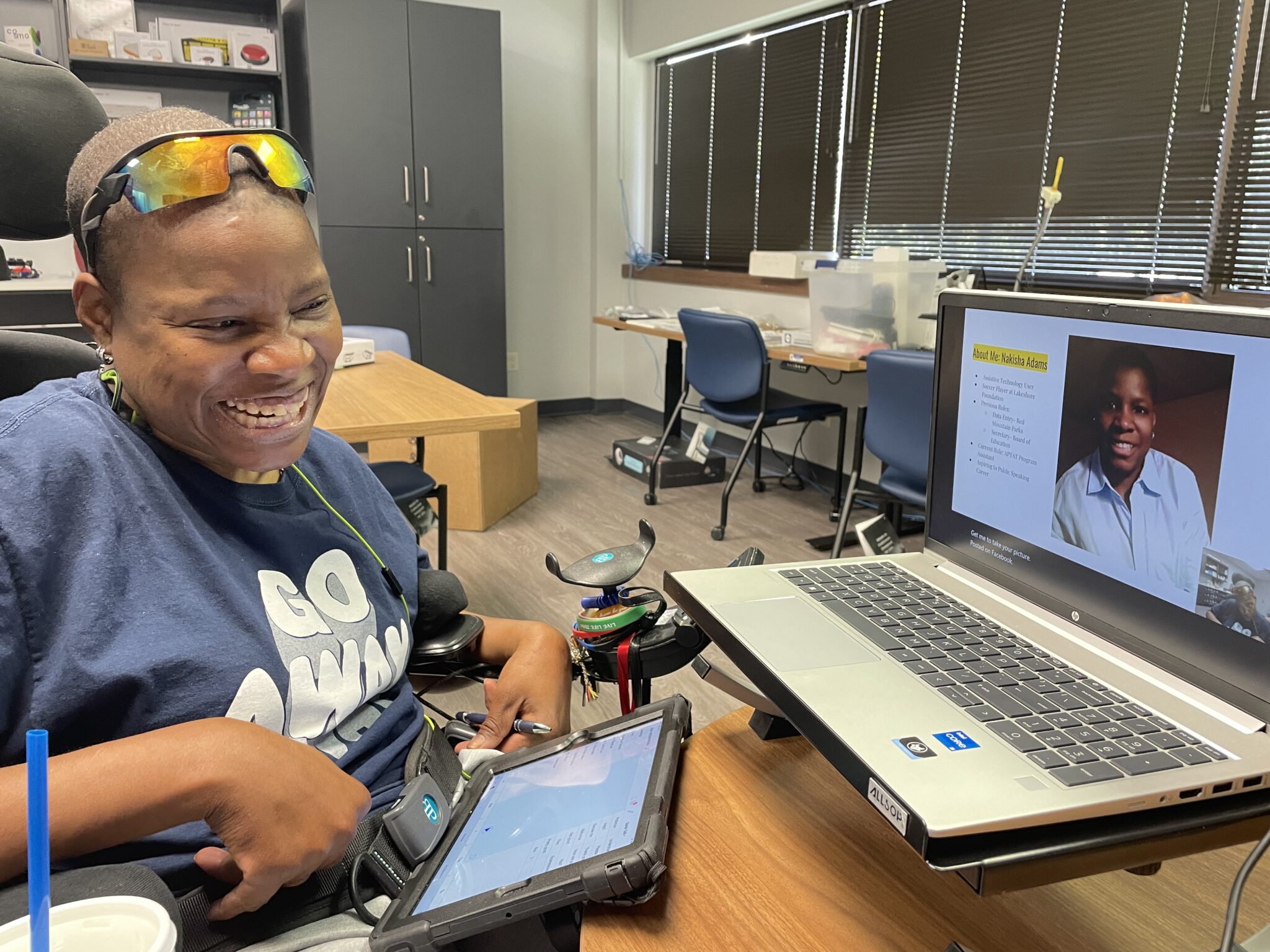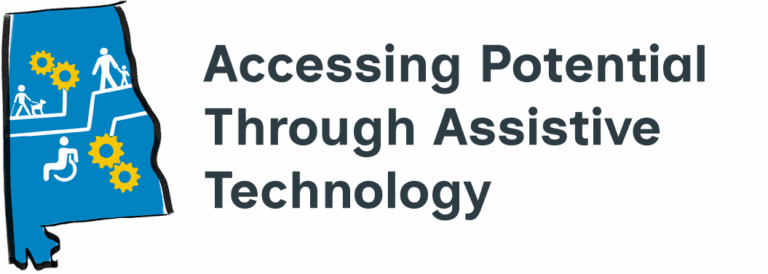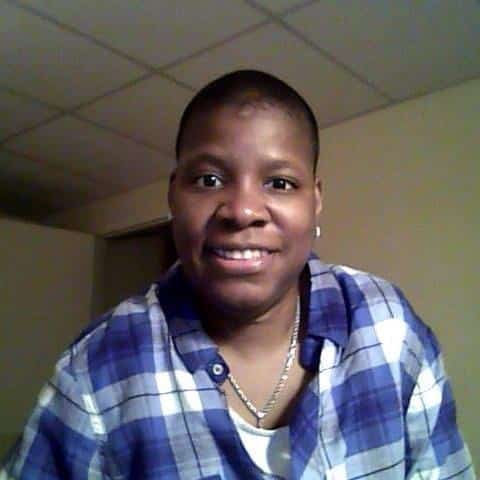
I was born with a disability called Cerebral Palsy (CP) which affects the way I talk and walk. CP affects everyone differently, but I need a wheelchair to get around and sometimes you need help understanding my speech. I was around 12 years old when I got my first wheelchair. The freedom I had, to be able to go where I wanted without asking someone for help, was liberating! My wheelchair has since become my lifeline and is crucial to my ability to do the things I want and need to do.
Although CP can make many tasks more difficult, it has never stopped me from pursuing my dreams. I live independently, work, and have a great social life. In the past, I’ve worked in data entry and a few different administrative roles. Now, I’m working towards a career in public speaking because it’s a passion of mine to help people understand that people with disabilities can achieve more than we’re given credit for.
When I started speaking in public, I was nervous that people wouldn’t understand me or even take the time to listen. Until a few years ago, when I was able to get my first talking device. It’s an app called Proloquo-4-Text on an iPad that I can pre-save messages into or type a new message to be read aloud when I need to say things on the fly. I don’t need it for every interaction, but I do use it as a tool when people can’t understand me or when I have a speaking engagement where I want to make sure people hear my message. By using both my voice and talking device, people can understand me more clearly.
Last year, I had the opportunity to begin working with Accessing Potential Through Assistive Technology (APTAT). APTAT is the Alabama Assistive Technology (AT) Act program and provides several services including a lending library of assistive technology equipment. One of our other services is to provide trainings and professional development on assistive technology. Participating in the development of those trainings has helped me gain the skills and experience I need to pursue my dream career.
Through APTAT I had the opportunity to present at a big assistive technology conference, ATIA in Orlando, Florida. I was nervous about speaking at the conference, but I was excited about the opportunity to share my story and inspire others.
I was also nervous about flying alone for the first time. For many, this might seem like a small thing, but for someone with a disability it can be a huge accomplishment. There are many experiences that weren’t designed with disability accessibility in mind and airline travel is definitely one of those! As a person with a disability, I’m no stranger to challenges and the need to pProve myself. I want to show others that I can do it, but I was determined to prove to myself, too, that I could do it.
The day of the flight didn’t start off well. Relying on the public bus system can be difficult, especially when I have a strict schedule like catching a flight. Usually when this is a concern, I will call MaxVIP and schedule a pickup (door to door service). Unfortunately, the scheduled MaxVIP bus did not arrive so I had to hurry to the bus station and hope I could make it in time to get on a bus to the airport.
Thankfully I made it on the next scheduled bus and got to the airport in time. When I arrived at the Birmingham airport, I was thankful to find they were prepared to help not just a newbie, but a newbie with a disability. They had someone walk me through the check in process at the counter. Another staff member escorted me through security, made sure I was at the right gate, and notified the flight crew that I would need additional assistance due to my wheelchair.
Once I arrived to Orlando, I found my way to ground travel where I was picked up by our scheduled wheelchair accessible taxi. I made it late to the hotel but just in time to eat dinner with my colleagues. It was a long day, but I couldn’t have asked for a better experience!
The next day I was able to enjoy my first big conference. Attending sessions to learn more about AT and exploring the big vendor hall to see the latest and greatest in AT. I know how much AT can positively impact someone’s life so it was really cool to see such a huge gathering of AT advocates.
On the second day my colleague and I geared up to present our session, “Host with the Most: Inclusive Party Planning”. We shared examples of technology that can help a person with (or without) a disability host a social event. We talked about ways to use Alexa reminders, grocery delivery services, and cool tech in the kitchen to get ready for a party. We also shared ways to make your event more inclusive and even shared some of our personal experiences on what makes an event more accessible to a variety of needs. It was awesome to have the opportunity to speak at a big, national conference.
The next day, we packed up to head home and this time I was able to travel on the same flight as my colleagues. We again, scheduled accessible taxi service to take us to the airport which required two accessible vans, one for each power chair, and an additional car for everyone else. My co-presenter and I had a hilarious taxi driver who entertained us with stories along the drive to the airport.
Unfortunately, that’s where the fun stopped. Check in at Orlando was very different than my experience had been in Birmingham. They didn’t take the time to wait for my response or listen to any information I wanted to share. The TSA agent assumed I was unable to travel by myself and was very rude and dismissive. They also assumed my coworker’s mom, who was in the same line with me must be my caregiver too. They scolded her for not staying with me to communicate for me. She advocated for me by exclaiming “She’s an independent, grown woman!”.
The TSA staff did not ask to take my bags or other attached items from my chair to run through the X-Ray machine, they just did it. They did the same to my colleague who relies on his cell phone to communicate when his communication device is stripped away. They took our things, our devices, and yet scolded us for not being able to communicate. By the time we made it through the screenings we all three were left exacerbated and fuming! Let’s just say, TSA could have done better. We later learned, while trying to determine how to avoid this issue in the future, that AT can remain with the person through screening and that you can also ask for disability assistance through the TSA Cares Assistance. They will assign an agent to escort you through TSA and advocate for your screening assistance.
The unfortunate flight experience home didn’t overshadow the whole experience because I could look at the major positive: I accomplished two major milestones: I flew on a plane by myself for the first time and presented at a national conference!
I’ve worked hard to get to where I am today, and I am living proof that anything is possible if set your mind to it. I hope that my story will inspire others to overcome challenges and pursue their dreams. I want people to see that having a disability might mean you have to do things in a different way and advocate for yourself relentlessly but it doesn’t mean you have to pass up big opportunities.

